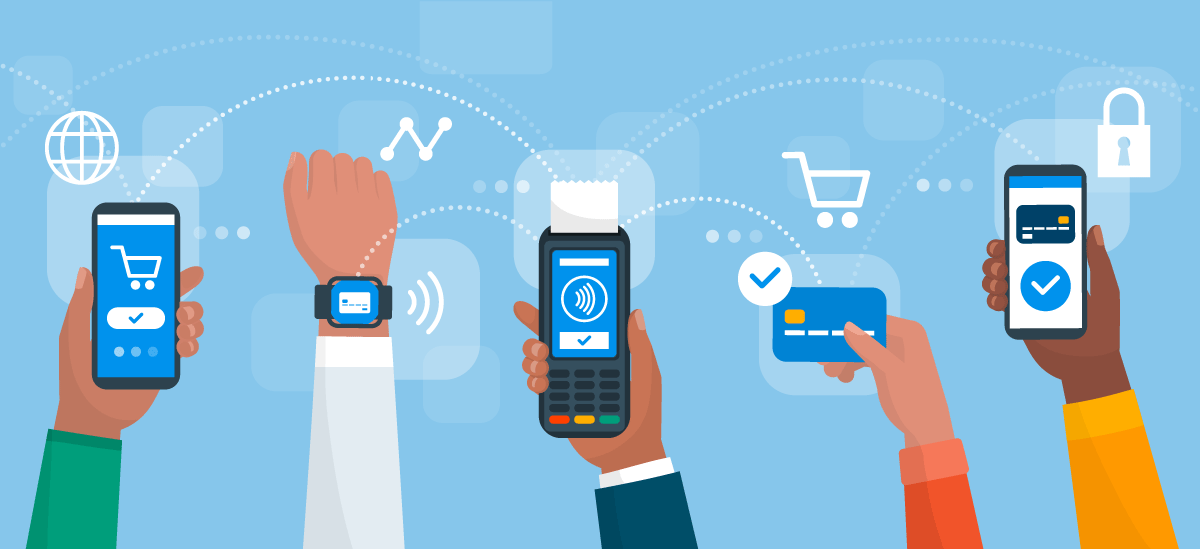
It’s a world of multiplying, sometimes bewildering, payment options. How can small businesses like yours keep up with the trends? Shana Peterson-Sheptak, PNC Bank’s Head of Business Banking, speaks to changes in the payments space taking place every day.
“It’s hard to keep up with the rapid introduction of new and varied payment technologies. Yet, every small business will need to keep up—and not to just provide convenience for customers, either. Keeping current is a security and productivity issue at the same time.”
That means staying attuned to rapidly changing technology and consumer behavior when it comes to how customers pay for your products or services . What’s at stake? Better customer experiences, competitiveness, and hopefully, overall improvements to your sales and bottom line.
“It’s been a whirlwind over the past few years, to be sure,” continues Peterson-Sheptak. “Technology has forever changed the entire landscape of how transactions take place. As a bank, we’ve worked hard to adapt, staying ahead of new payment technologies. And, more than ever, we’re helping our business clients master these changes to thrive.”
So, what’s on the road ahead in 2024? Payment technology will continue to evolve at a blistering pace. Here are a few developments that should be part of your planning in the new year.
It’s A Digital Payments World
While cash is always an option, cashless transactions such as credit and debit cards, mobile wallets, P2P apps such as Zelle®, ACH transfers and eCommerce are part of an accelerating trend in payment processing. That means your business likely will need to adapt, too.
“Credit cards and digital payments of all kinds, including applications such as Zelle, are just table stakes now for almost every business out there,” adds Peterson-Sheptak. “It’s just inescapable.”
Smartphone Shopping Gets More Popular
More and more customers are now relying on their smartphones to conduct purchases. In fact, in a recent survey, 61% of consumers now feel comfortable enough paying with a smartphone to leave their billfolds at home.[1] And, that number likely will increase steadily over time.
The reason for this is simple. Younger consumers prefer the convenience of using digital wallet apps at the cash register.
“Attitudes are changing,” Peterson-Sheptak points out. “While older consumers might be sticking with the tried-and-true payment methods, upcoming generations of consumers are continuing to diversify in their spending options. As a result, businesses of all sizes need to be equipped to handle greater levels of digital transactions.”
Contactless is Critical
What is a contactless payment? Any payment that involves tapping a credit card or smartphone, not swiping or dipping. While it was once a nice option for businesses to offer, contactless payments are becoming more and more the norm for even the smallest of businesses. Tap To Pay transactions, whether through credit cards with chips or mobile device, are expected to grow by 150% by 2028.[2]
“Not only is contactless technology becoming ubiquitous,” Peterson-Sheptak adds, “but there’s a vested interest in its use among consumers, merchants, and card issuers alike. It’s convenient, but it’s also more secure. So, contactless payments are now an essential part of the mix.”
Payment Fraud Looms Larger
How big has credit card fraud become? In 2023, it is estimated that retailers will lose about $130 billion on card-not-present transactions.[3] While there is no foolproof system when it comes to preventing credit card fraud, contactless systems represent more peace of mind for businesses and customers alike. This is especially true when compared to traditional credit cards with customer information embedded in the card’s magnetic stripe.
What’s at stake for businesses like yours?
- Financial loss. Payment fraud can result in significant financial losses for businesses or hurt your reputation with customers.
- Chargeback fees. If a customer disputes a charge, you may be required to pay a chargeback fee. Higher chargeback ratios could mean higher processing fees.
- Legal and regulatory consequences. You have an obligation to prevent fraud. In some cases, failing to take adequate measures could have legal or regulatory consequences.
- Time costs money, too. The more time you spend chasing down potential fraud, the less time you have for the business. So, staying atop fraud saves a lot more than cash.
“Awareness of potential payment fraud is become more important than ever,” continues Peterson-Sheptak. “While banks work hard to stop fraudsters, businesses need to be alert as well.”
Want to stop payment fraud? We have thoughts on how to make your business—and your money—a good deal more secure.
Integrated Solutions
Payment systems are not just about accounting for the inflow of money into your business. The more you integrate your point-of-sale (POS) within every aspect of your operations, the more productivity and profitability you can wring from your business. Peterson-Sheptak is excited about the new opportunities these kinds of systems represent for the shrewd entrepreneur.
“An integrated POS can connect everything in your operations, from sales to inventory management to marketing. In fact, there are integrated solutions that are customized by industry.”
One integrated POS specifically designed for the hospitality industry is Linga®, with modules designed for specific niches within the industry such as coffee shops, pizza parlors, franchise operations, and a good deal more. Cloud-based, processor-agnostic, Linga represents a new approach to POS systems that emphasizes ease of use and continuous adaptation to shifts in technology and the marketplace.
And those are just a few of the trends shaping the world of payments in the year ahead. As fast as business moves in today’s environment, it’s important to stay on top of how and why your customers choose to pay. PNC Bank and its team of small business specialists stand ready to help as you navigate the trends shaping your business next year and beyond. Learn more about how PNC can empower your business here.




